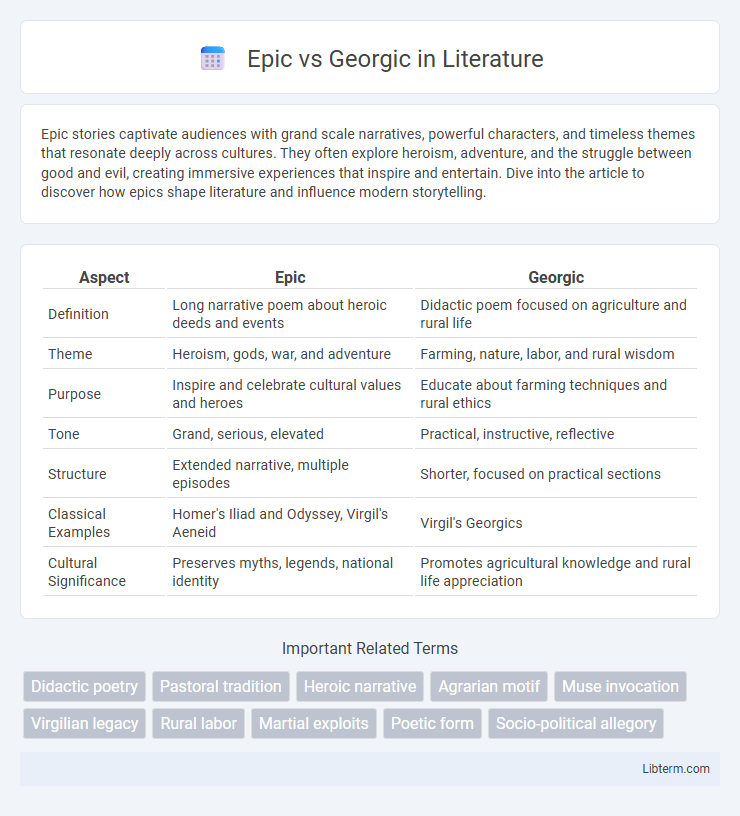Epic stories captivate audiences with grand scale narratives, powerful characters, and timeless themes that resonate deeply across cultures. They often explore heroism, adventure, and the struggle between good and evil, creating immersive experiences that inspire and entertain. Dive into the article to discover how epics shape literature and influence modern storytelling.
Table of Comparison
| Aspect | Epic | Georgic |
|---|---|---|
| Definition | Long narrative poem about heroic deeds and events | Didactic poem focused on agriculture and rural life |
| Theme | Heroism, gods, war, and adventure | Farming, nature, labor, and rural wisdom |
| Purpose | Inspire and celebrate cultural values and heroes | Educate about farming techniques and rural ethics |
| Tone | Grand, serious, elevated | Practical, instructive, reflective |
| Structure | Extended narrative, multiple episodes | Shorter, focused on practical sections |
| Classical Examples | Homer's Iliad and Odyssey, Virgil's Aeneid | Virgil's Georgics |
| Cultural Significance | Preserves myths, legends, national identity | Promotes agricultural knowledge and rural life appreciation |
Defining Epic and Georgic: A Genre Overview
Epic poetry is characterized by its grand narrative scope, heroic characters, and themes of valor, often recounting legendary or historical events with elevated style and formal structure. Georgic poetry, rooted in agriculture and rural life, emphasizes practical knowledge and moral lessons, blending didactic elements with poetic form to celebrate the labor and rhythms of nature. Both genres serve distinct cultural functions: epic glorifies heroic deeds and civilization's origins, while georgic instructs and honors the agrarian foundation of society.
Historical Origins and Development
Epic poetry originated in ancient Mesopotamia and Greece, with foundational texts like the "Epic of Gilgamesh" and Homer's "Iliad" shaping its classical form emphasizing heroic narratives and divine intervention. Georgic poetry, rooted in Virgil's "Georgics" from Augustan Rome, evolved as a didactic genre focusing on agriculture, rural life, and practical wisdom, reflecting Rome's socio-economic conditions and values during the 1st century BCE. The development of both genres reflects distinct cultural priorities: epic poetry centers on mythic heroism and national identity, while georgics foreground the harmony between humans and nature through agrarian themes.
Key Themes in Epic Poetry
Epic poetry centers on grand heroic deeds, the fate of nations, and divine intervention, emphasizing themes of bravery, honor, and the struggle between mortals and gods. It often explores the journey of legendary warriors or leaders, highlighting their virtues and flaws within a broader cosmic or historical framework. These themes underscore the eternal conflict between good and evil, the importance of legacy, and the human condition in the face of destiny.
Foundational Themes in Georgic Poetry
Georgic poetry centers on themes of agriculture, labor, and the harmonious relationship between humans and nature, emphasizing practical knowledge and rural life. It explores the cyclical patterns of growth, seasons, and the moral virtues derived from toil and stewardship of the land. Unlike epic poetry's grand heroic narratives, georgics focus on everyday work, sustainability, and the intimate connection to the earth as foundational to civilization.
Structure and Style: Epic vs Georgic
Epic poetry features grand, lengthy narratives often centered around heroic deeds, employing an elevated, formal style with extensive use of similes, epithets, and invocations to the muse. Georgic poetry adopts a more didactic and instructional tone, focusing on rural life, agriculture, and nature, characterized by clear, practical language and a balanced, steady rhythm. While both forms use classical meter, epics tend to emphasize expansive storytelling and dramatic scenes, whereas georgics prioritize detailed descriptions and moral reflections on farming and the natural world.
Notable Examples from Classical Literature
Epic poetry includes notable examples such as Homer's "Iliad" and "Odyssey," which depict grand heroic narratives centered on gods and warriors. Georgic poetry, exemplified by Virgil's "Georgics," focuses on agricultural themes and rural life, providing practical advice intertwined with poetic form. Both genres reflect distinct classical literary traditions that highlight either epic heroism or pastoral labor.
The Role of Heroism and Labor
Epic poetry celebrates heroic figures engaging in grand quests and supernatural feats, often portraying heroism as a display of valor, honor, and divine intervention. Georgic poetry emphasizes labor, agriculture, and rural life, framing heroism in terms of diligence, practical skill, and the moral value of hard work. The contrast highlights epic heroism as extraordinary and legendary, while georgic heroism centers on everyday perseverance and the cultivation of the land.
Language, Imagery, and Tone Comparisons
Epic poetry employs elevated, formal language rich in heroic epithets and extended similes, creating grandiose imagery that evokes vast battles and divine interventions. Georgic poetry features more straightforward, didactic language centered on rural life and agricultural practices, using vivid natural imagery to highlight pastoral scenes and seasonal cycles. The tone in epics is often majestic and serious, emphasizing heroism and fate, while georgics adopt a calm, instructional tone aimed at practical wisdom and harmony with nature.
Cultural Impact and Influence
Epic poetry, exemplified by works like Homer's "Iliad," shaped Western literary traditions by encapsulating heroic ideals, national identity, and collective memory, profoundly influencing narrative structures and cultural values. Georgic poetry, inspired by Virgil's "Georgics," fostered a deep appreciation for agrarian life, environmental harmony, and rural virtues, significantly impacting Renaissance and Neoclassical agricultural discourse and ecological awareness. Both genres contributed distinct paradigms to literature and culture, with epic affirming human grandeur and stoicism, while georgic emphasized sustainable coexistence with nature and practical wisdom.
Modern Adaptations and Legacy
Modern adaptations of Epic poetry often emphasize heroic narratives and grand themes in contemporary novels, films, and video games, reinforcing the genre's legacy in popular culture. Georgic adaptations focus on environmental literature and eco-poetry, highlighting agricultural themes and humanity's relationship with nature in modern sustainability discourse. Both genres influence literary traditions by preserving distinct cultural values: the Epic inspires epic storytelling and heroism, while the Georgic underlines pastoral life and ecological awareness.
Epic Infographic

 libterm.com
libterm.com